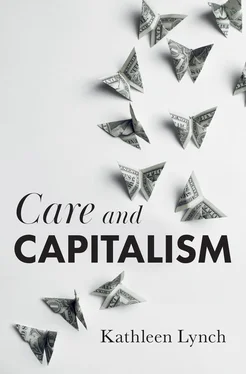1 ...8 9 10 12 13 14 ...21 Within each of these circles of care, people live in varying states of dependency and interdependency. And each care reality is intersectionally connected to the other, moving along a fluid continuum from deep and consistent love, care and solidarity to carelessness, neglect, abuse and violation ( figure 1).
Within primary care relations, labours of abuse and neglect can replace love labouring, not only denying someone the benefits of love labour but damaging the person through violation (Feeley 2009). Equally, in the secondary care relations fields, other-centred care labouring may or may not take place. Highly competitive work environments do not generate cultures of care and concern (Ball 2003; Gill 2009; Grummell, Devine and Lynch 2009). Neighbourhoods mired by poverty, war or violence are not likely to produce the kind of trust that underpins neighbourly care; exclusionary forms of social capital persist (Leonard 2004). Higher levels of economic inequality within countries generate greater distrust and less willingness to show solidarity with vulnerable others, either within one’s own country or outside of it (Paskov and Dewilde 2012). There is, therefore, nothing inevitable in the love, care and solidarity world; the relational sphere provides contexts where these qualities can be either fostered or destroyed, not least because economic, political and cultural injustices interpellate with affective relations and frame their character (Wilkinson and Pickett 2018).
Neoliberal Capitalism, Inequality and Care
Although there is a danger in making capitalism the centre of all meaning-making when framing the politics of social justice (Gibson-Graham, Cameron and Healy 2016), the sociological reality is that neoliberal capitalism exercises a pervasive influence on social thought. It observes and locates people via mobile phones, credit cards and satellites; it exercises control over tastes and preferences through subliminal advertising, mediates communication and measures and records movement, all for the purposes of profit-making (Zuboff 2019). Even if its influence is indirect, the world is governed by its precepts. What makes capitalism so powerful is that it is deeply embedded historically. Its ecology and values shaped the modern nation state through force and coercion, as well as through enticement and consent (Graeber 2011; Patel and Moore 2018). 5In its neoliberal form, capitalism is culturally pervasive and ideologically ingrained in major media, educational, cultural and recreational institutions (McGuigan 2010). While it is contested intellectually, it exercises an ideological hegemony that is very difficult to undermine (Leyva 2019).
Neoliberal capitalism is also institutionally hegemonic in the politics and economy of global life. It has been embedded and legitimated through the diffusion and enforcement of its principles in debtor countries in South America (Kentikelenis and Babb 2019), and more recently, with the support of the European Central Bank and the European Commission, within Europe (Kalaitzake 2017; Storey 2019). While the scope, scale and form of inequality arising from capitalism vary over time and with the politics of particular jurisdictions (Hall and Soskice 2001; Streeck 2016), since the 1980s advanced capitalist economies have, to a greater or lesser degree, been reorganized to reflect a distinctly neoliberal and deeply inegalitarian-led model of socio-economic (re-)production. Social class polarizations have grown, with income inequality increasing rapidly in North America, China, India and Russia since 1980, and growing moderately in Europe also during that period (Alvaredo, Chancel, Pikettty, Saez and Zucman 2018). The rise of wealth and income concentration at the top of so many national economies takes ‘oligarchic’ forms with high concentrations of wealth in family networks. The rich have become so rich that they perceive the fate of themselves and their families ‘to be independent of the fate of the societies where they extract their wealth’ (Streeck 2016: 28–9).
Upper-class detachment is paralleled by the rise of middle-class and working-class insecurities in a precarious working environment in Western democracies (Standing 2011). Fear of losing class privileges and related securities is heightened with the rise of precarious work among the previously secure middle classes (Mau 2015). The detachment of the super-rich and the exacerbation of middle-class insecurities have created a strong bulwark against promoting solidarity and care within welfare states in Europe (Frericks 2010).
The anti-care culture of neoliberal politics
As atomistic market relationships, aligned with and valorized within capitalism, tend to cultivate social relations built on risk/reward calculations, they encourage individuals to be highly competitive, be it in relation to job security, material wealth, social status or moral worth (Wilkinson and Pickett 2009; Bröckling 2015). This feeds disinterestedness and detachment from unaligned and unusable others. Capitalism produces a social ‘nature’ in humans that is characterized by coldness and indifference in politics and public life (Adorno 1978; Ferrarese 2017b). At the same time, rising inequality generates widespread feelings of suspicion, anger and resentment among the body politic and is an important factor in propelling the rise of new-right politics (Golder 2003). 6These combined processes fuel political detachment and undermine the trust that underpins social solidarity and care for vulnerable others (Lynch and Kalaitzake 2018).
These dispositions are exacerbated in neoliberal politics as it is built on the essentialist assumption that human beings are primarily possessive and instrumentally rational individuals, who, while capable of being altruistic, work primarily in ways that are in accordance with their own self-interests (Friedman 2002). To channel this self-interest into politically valuable forms, individuals and institutions must be free from constraints; deregulation, privatization and competition are the guiding organizational norms of the neoliberalized economy and of social and economic life (Harvey 2005: 64–70). Neoliberalism is not only an analytical model, therefore: it is also a normative framework; it prescribes who you should be and how you should be. And it is a political-economic model that demands the state facilitate, implement and enforce free market economics and logics regionally and globally, and across all types of institutions and organizations (Leyva 2019). Neoliberalism does not abandon the state but enlists it to serve its own logic and purposes in a way that is increasingly welfare-indifferent (Korpi 2003; Frericks 2011; Gingrich and Häusermann 2015; Mau 2015). 7
Domination and carelessness: pre-capitalist antecedents
There is nothing new about the human desire to exercise dominion and power over others and over the environment; such dispositions and practices have a long history across cultures and time wherever untrammelled power reigns. In gender terms, the enslavement of women, be it as a form of family currency in marriage arrangements or as a peace offering in times of war, showed scant regard for their care; and it preceded the formation of classed systems of oppression by a few thousand years (Lerner 1986: 212–19). In racial terms, hierarchical binaries between human, thinking beings and non-human, extended things (Patel and Moore 2018: 44–63) led to ‘natives’ being defined as ‘a sort of quintessential evil’ that had to be eradicated (Fanon 1967: 32). Defined as less than human by their skin colour (Tsri 2016), many African people became ‘things’ to be exploited for profit by powerful men and women for their own ends, while those who were defined as ‘Oriental’, or Eastern, were presumed to be culturally inferior to Western peoples (Said 1978).
Читать дальше












